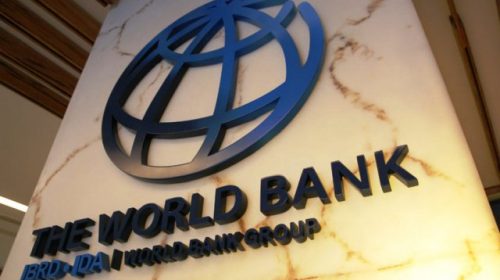Inflation Dips Further to 12.48% … Though price of food still high

The National Bureau of Statistics (NBS), has disclosed that the inflation rate has dropped to 12.48 in March 2018 from 13.34 per cent recorded in April.
This is the 15th consecutive month since January 2017, the inflation rate recorded a decline even though food prices remained high.
Last month’s drop in the Consumer Price Index (CPI) inched closer to the Central Bank of Nigeria’s (CBN) target of 12 per cent of less, signposting the commencement of monetary policy easing by the central bank possibly by the second half of 2018.
According to the latest figures released by the National Bureau of Statistics (NBS), the CPI, which measures inflation stood at 12.48 per cent (year-on-year) in April 2018, indicating a 0.86 percentage points drop in the 13.34 per cent rate recorded in March 2018.
Also, on a month-on-month basis, the headline index increased by 0.83 per cent in April 2018, up by 0.01 percentage points from the rate recorded in March.
Increases were recorded in all Classification of Individual Consumption by Purpose (COICOP) divisions that yield the headline Index.
On a month-on-month basis, the headline index increased by 0.83 per cent in April 2018, down by 0.01 percentage points from the rate recorded in March 2018.
The percentage change in the average composite CPI for the 12-month period ending April 2018 over the average of the CPI for the previous twelve-month period was 15.20 per cent, showing a 0.40 percentage difference.
The urban inflation rate eased by 12.89 per cent (year-on-year) in April 2018 from 13.75 per cent recorded in March, while the rural inflation rate also eased by 12.13 percent in April 2018 from 12.99 per cent in March.
On month-on-month basis, the urban index rose by 0.85 per cent in April 2018, down by 0.01 from 0.86 per cent recorded in March, while the rural index also rose by 0.82 per cent in April 2018, recording no
change from the figure obtained in March (0.82) per cent.
The corresponding 12-month year-on-year average percentage change for the urban index was 15.47 per cent in April 2018.
This was less than 15.87 per cent reported in March, while the corresponding rural inflation rate in April 2018 was 14.95 per cent compared to 15.34 per cent recorded in March.
The composite food Index rose by 14.80 per cent in April 2018. The rise in the index was caused by increases in the prices of potatoes, yam and other tubers, fish, bread and cereals, oil and fats, vegetables and meat.
On a month-on-month basis, the food sub-index increased by 0.91 per cent in April 2018, up by 0.01 per cent points from 0.90 per cent recorded in March.
The average annual rate of change of the food sub-index for the twelve-month period ending April 2018 over the previous 12-month average was 18.89 percent, 0.4 percent points from the average annual rate of change recorded in March (19.29) per cent.
The rise in the food index was caused by increases in prices of potatoes, yam and other tubers, fish, bread and cereals, oil and fats, vegetables, coffee, tea and cocoa, meat, milk, cheese and eggs.
The ‘’All Items less Farm Produce’’ or Core inflation, which excludes the prices of volatile agricultural produce is 10.9 per cent in April 2018, down by 0.3 per cent points from the rate recorded in March (11.2) per cent.
On a month-on-month basis, the core sub-index increased by 0.87 per cent in April 2018, this was up by 0.03 per cent when compared with 0.84 per cent recorded in March.
The average 12-month annual rate of change of the index was 12.02 per cent for the 12-month period ending April 2018; this is 0.31 percent points lower than 12.33 percent recorded in March.
The highest increases were recorded in prices of Fuel and lubricants for personal transport equipment, vehicle spare parts, garments and clothing materials and other articles of clothing and clothing accessories, hairdressing salons and personal grooming establishment, paramedical services and pharmaceutical products Price
All items inflation on a year-on-year basis was highest in Kebbi (15.94 per cent), Rivers (15.01 per cent) and Yobe (14.93 per cent), while Kwara (9.77 per cent), Delta (10.46 per cent) and Benue (11.19 per cent) recorded the slowest rise in headline year-on-year inflation.
However, on a month–on-month basis, the April 2018 all items inflation was highest in Kebbi (1.73 per cent), Rivers (1.72 per cent) and Lagos (1.60 per cent), while Bauchi (0.01 per cent) recorded slowest rise and Kaduna and Kano recorded price deflation on a month-on-month all item basis in April 2018.
Food Inflation on a year-on-year basis was highest in Kebbi (17.92 per cent), Bayelsa (17.85 per cent) and Nasarawa (17.71 per cent), while Benue (10.95 per cent), Kogi (12.27 per cent) and Gombe (12.46 per cent) recorded the slowest rise in food inflation.
On a month-on-month basis however, April 2018 food inflation was highest in Lagos (2.49 per cent), Ekiti and Kebbi (2.0 per cent) and Rivers (1.98 per cent), while Benue, Borno, Kaduna, Kano and Nasarawa all recorded food price deflation or negative inflation (general decrease in the general price level of goods and services or a negative inflation rate) in April 2018.







Leave a Reply